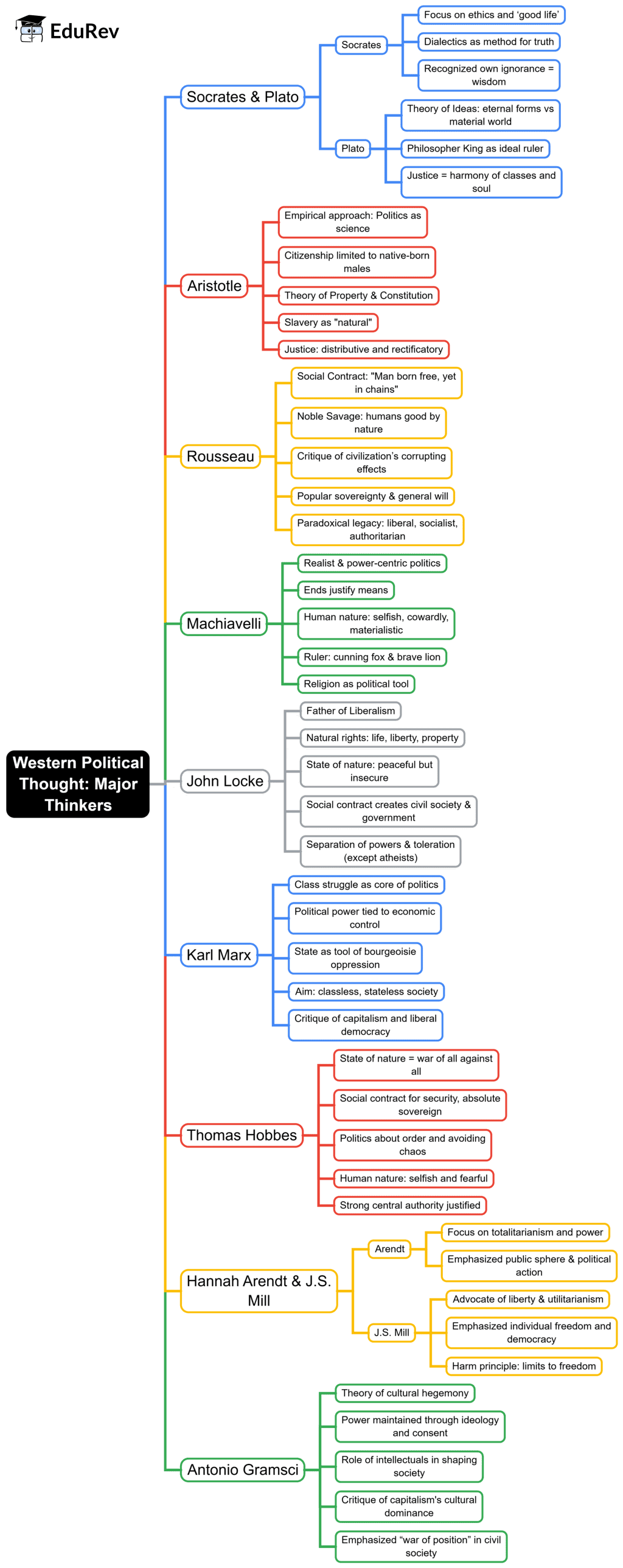UPSC Exam > UPSC Notes > PSIR Optional for UPSC > Mind Map: Western Political Thought
Mind Map: Western Political Thought | PSIR Optional for UPSC PDF Download

The document Mind Map: Western Political Thought | PSIR Optional for UPSC is a part of the UPSC Course PSIR Optional for UPSC.
All you need of UPSC at this link: UPSC
|
173 videos|574 docs|148 tests
|
FAQs on Mind Map: Western Political Thought - PSIR Optional for UPSC
| 1. What are the key themes in Western political thought? |  |
Ans. Key themes in Western political thought include the nature of justice, the role of the state, individual rights versus collective good, democracy and governance, and the impact of capitalism and socialism. Philosophers like Plato, Aristotle, Hobbes, Locke, Rousseau, and Marx have contributed significantly to these themes, shaping the discourse on how societies should be organized and governed.
| 2. How did Enlightenment thinkers influence modern political systems? |  |
Ans. Enlightenment thinkers such as John Locke, Montesquieu, and Voltaire emphasized reason, individualism, and skepticism of authority. Their ideas led to the development of democratic principles such as separation of powers, social contract theory, and human rights, greatly influencing modern political systems, particularly in the establishment of democratic governance and legal frameworks in the West.
| 3. What is the significance of the social contract theory in Western political thought? |  |
Ans. The social contract theory is significant as it explores the legitimacy of authority and the origins of government. Thinkers like Hobbes, Locke, and Rousseau proposed that governments derive their authority from the consent of the governed. This idea underpins democratic governance and the protection of individual rights, highlighting the relationship between citizens and their state.
| 4. How do classical and contemporary political theories differ? |  |
Ans. Classical political theories, like those of Plato and Aristotle, focus on ideals of virtue, the role of the polis, and natural law. In contrast, contemporary theories often emphasize empirical analysis, the role of institutions, and individual rights. While classical theories may prioritize the common good, contemporary theories frequently address issues of diversity, identity, and social justice.
| 5. What role did Marxism play in shaping Western political thought? |  |
Ans. Marxism played a crucial role by critiquing capitalism and proposing a revolutionary approach to class struggle and economic inequality. It introduced concepts such as historical materialism and the idea that societal change arises from class conflict. Marxist theory has influenced various political movements and ideologies, leading to discussions about socialism, communism, and the role of the state in addressing economic disparities.
Related Searches
















